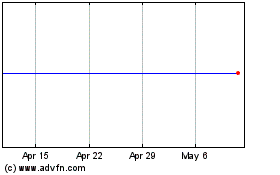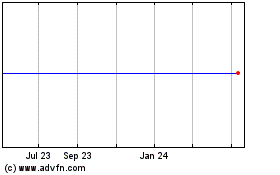US Government Gulf Drilling Halt Delays $1.6 Billion-$2.9 Billion In Spending -Study
May 19 2010 - 6:23PM
Dow Jones News
Between $1.6 billion and $2.9 billion worth of drilling in the
Gulf of Mexico will be delayed by the federal government's
temporary halt on new permits following the Deepwater Horizon
disaster, according to a report by energy consultancy Wood
Mackenzie.
Earlier this month, the U.S. Department of the Interior said it
would issue no new drilling permits until at least May 28, the
deadline for the initial report on the accident that unleashed a
massive oil leak that continues to threaten the Gulf Coast. Oil and
gas producers are concerned that the moratorium could be extended
and impinge on future drilling plans in the Gulf, which provides
about 30% of the oil and 12% of the natural gas consumed in the
U.S.
If the moratorium on new permits were to be extended to six
months, about 80,000 barrels of oil equivalent per day, or 4% of
projected 2011 oil and gas output would be deferred, the Edinburgh,
Scotland-based consulting firm wrote.
Wood Mackenzie said the development of several existing oil
discoveries in the area could also be jeopardized by delays and
substantial cost increases resulting from stricter safety
regulations expected to follow last month's fatal burning and
sinking of Transocean Ltd.'s (RIG) Deepwater Horizon rig, which BP
PLC (BP) was leasing. These delays and higher costs could defer as
much as 19%, or 350,000 barrels of oil equivalent a day, of
projected deepwater Gulf production in 2015 and 2016.
An extension of the drilling moratorium would lead to longer
drill times, raising both exploration- and development-well costs.
A 10% increase in overall capital expenditure would drop the
internal rate of return--a measure used by companies to compare
profitability of investments--of Gulf of Mexico oil discoveries to
15% or less. This would put several of them close to, or below, the
profitability rates required to proceed with a project, according
to the report.
"Since development drilling costs can be up to 70% of total
capital expenditure, the impact on overall project economics could
be detrimental to the extent that it throws into question the
viability of a number of projects, both large and small," says
Julie Wilson, Wood Mackenzie's analyst for the Gulf of Mexico and
author of the study.
The report estimates that seven out of 13 current discoveries in
the deepwater Gulf of Mexico could be rendered uneconomic to
develop if the government extends the offshore drilling ban to six
months, putting $7.6 billion in future government revenues at risk.
The report doesn't specify the names of the discoveries.
Extending the drilling ban could also force oil-services
companies to move equipment, including drilling rigs priced at up
to $500,000 a day, out of the Gulf to keep them gainfully employed,
according to the report. "If this happens, bringing equipment back
to the Gulf of Mexico could take time, so there could be a drag
effect on new drilling," Wilson said.
-By Isabel Ordonez, Dow Jones Newswires; 713.547.9207;
isabel.ordonez@dowjones.com
Cooper Cameron (NYSE:CAM)
Historical Stock Chart
From Jun 2024 to Jul 2024

Cooper Cameron (NYSE:CAM)
Historical Stock Chart
From Jul 2023 to Jul 2024
